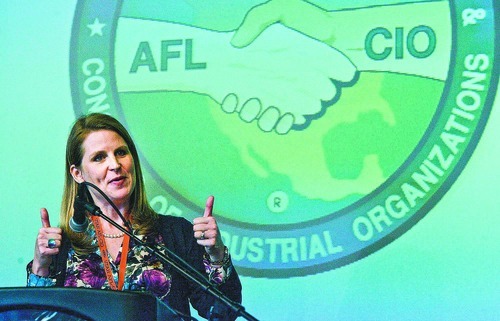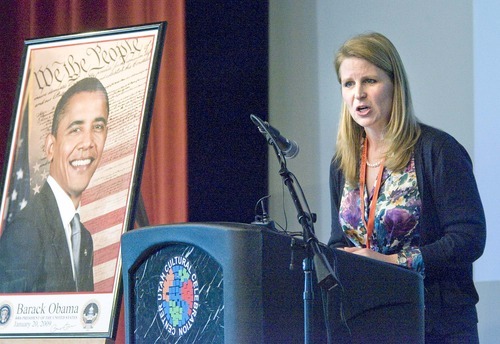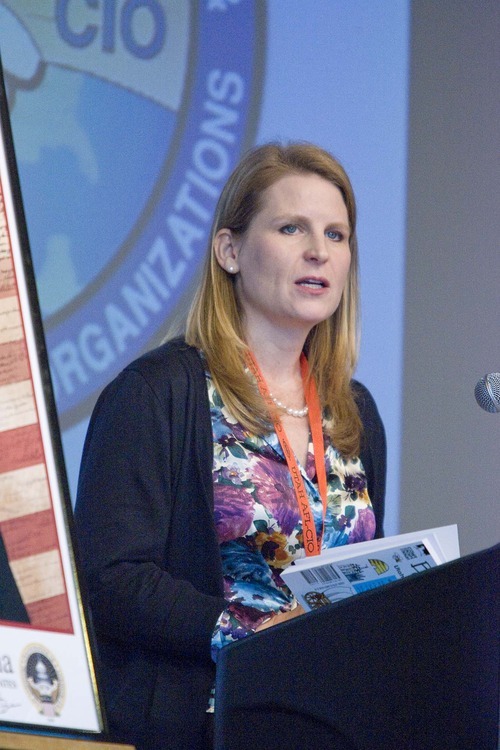This is an archived article that was published on sltrib.com in 2011, and information in the article may be outdated. It is provided only for personal research purposes and may not be reprinted.
To make her point, Elizabeth Shuler asked all 200 delegates attending the Utah AFL-CIO convention to stand.
Then, the secretary-treasurer for the national AFL-CIO asked those delegates aged 55 years and older to sit down. She followed her request by asking those older than 45 to be seated, and then repeated the request to those over 35 years old
Only about a half dozen delegates remained on their feet.
And that, Shuler said, represents one of the biggest challenges faced by organized labor in this country. Too few younger workers are involved in the labor movement, and there needs to be a lot more.
"I've been in state conventions with more than 500 delegates in attendance, and only one or two people [under age 35] were left standing," she said, indicating that unions need to attract more young workers who will be the future of the labor movement in this country.
Shuler, 40, holds the distinction of being the youngest officer ever to sit on the federation's executive council and is heading the AFL-CIO's young worker outreach initiative. She was the keynote speaker at the Utah AFL-CIO convention that was held Friday in West Valley City.
After her speech, she said only about 24 percent of labor union members are under 35 years old.
"We haven't done a good job attracting younger workers and getting them involved. And part of that is our seniority system doesn't always give younger members as much of an opportunity to get engaged in leadership roles," she said.
Wayne Holland, the United Steel Workers international staff representative for Utah and northern Nevada, said Shuler's speech was inspirational and described her as a significant presence in the effort to attract younger workers to the labor movement.
And he offered another explanation for why many younger workers haven't yet embraced the labor movement.
"We have gone through a long period of time of downsizing in the construction, mining and manufacturing — industries that traditionally have been strongholds of the labor movement. And with that shrinkage and the movement of jobs overseas it has been harder for younger workers to find jobs in those industries," he said.
Katy Hogge, a delegate from the Office and Professional Employees International Union Local 272 who was one of the few delegates under 35 years old still standing, said union members haven't always done a good job of getting the message out about the benefits of being part of the labor movement.
"I grew up in Utah and my father was a refinery worker who was a union member but he never really said too much about it," she said. "It wasn't until I was in my early 20s that I started to learn about the labor movement and decided I wanted to get involved."
Utah AFL-CIO President Jim Judd agreed that organized labor needs to do a better job getting the message out that it stands for the rights of working men and women.
"I've been in classrooms where I had the opportunity to ask students why they are in school rather than out working. A lot of them didn't know that they were in school because labor unions fought for child labor laws. I had to explain to them that they were able to go on vacations with their families because the labor movement fought for paid vacations and that the reasons their parents weren't working 10 hours a day seven days a week is because we fought for 40-hour workweeks."
Shuler said there have been some bright spots for the labor movement, including the recent rules promulgated by the National Labor Relations Board that are designed to make organizing "a little more fair and speedier."
Yet she lamented the recent decision by the Wisconsin Supreme Court that supported what she called Gov. Scott Walker's anti-public employee union legislation. The law eliminates most of that state's public employees' collective bargaining rights.
"It was infuriating," she said of the ruling, which challenged the adoption of the law on procedural ground. "And we have a lot of work to do to get that law repealed."
Twitter: OberbeckBiz







